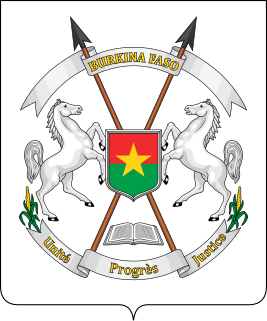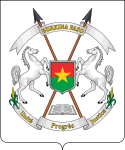
Burkina Faso is a landlocked country in West Africa with an area of 274,200 km2 (105,900 sq mi), bordered by Mali to the northwest, Niger to the northeast, Benin to the southeast, Togo and Ghana to the south, and the Ivory Coast to the southwest. It has a population of 20,321,378. Previously called Republic of Upper Volta (1958–1984), it was renamed Burkina Faso by President Thomas Sankara. Its citizens are known as Burkinabè, and its capital and largest city is Ouagadougou.

The Politics of Burkina Faso takes place in a framework of a semi-presidential republic, whereby the Prime Minister of Burkina Faso is the head of government, and of a multi-party system. The President of Burkina Faso is the head of state. Executive power is exercised by both the President and the Government. Legislative power is vested in both the government and parliament. The party system was dominated by the Congress for Democracy and Progress (CDP) until the 2014 Burkinabé uprising. Since then, the CDP has lost influence. The Judiciary is independent of the executive and the legislature. The Economist Intelligence Unit rated Burkina Faso a "hybrid regime" in 2019.

The history of Burkina Faso includes the history of various kingdoms within the country, such as the Mossi kingdoms, as well as the later French colonisation of the territory and its independence as the Republic of Upper Volta in 1960.

Blaise Compaoré is a Burkinabé-Ivorian former politician who served as the second president of Burkina Faso from 1987 to 2014. He was a close associate of the first president, Thomas Sankara, during the 1980s, and in October 1987, he led a coup d'état during which Sankara was killed. Subsequently, he introduced a policy of 'rectification', overturning the leftist and Third Worldist policies pursued by Sankara. He won elections in 1991, 1998, 2005 and 2010, in what were considered unfair circumstances. His attempt to amend the constitution to extend his 27-year term caused the 2014 Burkinabé uprising. On 31 October 2014, Compaoré resigned, whereupon he fled to the Ivory Coast.

Elections in Burkina Faso gives information on election and election results in Burkina Faso.

Roch Marc Christian Kaboré is a Burkinabé banker and politician who served as the President of Burkina Faso from 2015 until he was deposed in 2022. He was the Prime Minister of Burkina Faso between 1994 and 1996 and President of the National Assembly of Burkina Faso from 2002 to 2012. Kaboré was also president of the Congress for Democracy and Progress (CDP) until his departure from the party in 2014. He founded the People's Movement for Progress party that same year.

The unicameral National Assembly is Burkina Faso's legislative body. In 1995, it became the lower house of a bicameral Parliament, but the upper house was abolished in 2002. The upper house was to have been restored under the name "Senate" in the June 2012 constitutional amendments. This revision was never executed due to an extended and unresolved political confrontation over the Senate's establishment, which left the country effectively with a unicameral legislature as of the October 2014 constitutional crisis.

The Radiodiffusion Télévision du Burkina is the national broadcaster of the West African state of Burkina Faso. Radiodiffusion Télévision du Burkina is headquartered in the capital city Ouagadougou. Generaldirector (CEO) of RTB is Marcel Toé.

General elections were held in Burkina Faso on 29 November 2015. The elections were the first national elections in the country since the 2014 Burkinabé uprising and the departure of President Blaise Compaoré, who had ruled Burkina Faso for 27 years. The party of former President Compaoré, the Congress for Democracy and Progress, was banned from presenting a presidential candidate in the presidential elections but was still able to participate in the parliamentary election.

The 2014 Burkina Faso uprising was a series of demonstrations and riots in Burkina Faso in October 2014 that quickly spread to multiple cities. They began in response to attempts at changing the constitution to allow President Blaise Compaoré to run again and extend his 27 years in office. Pressure for political change came from civil society and in particular from the country's youth. Following a tumultuous day on 30 October, which included the involvement of former Defence Minister Kouamé Lougué and the burning of the National Assembly and other government buildings as well as the ruling Congress for Democracy and Progress party's headquarters, Compaoré dissolved the government and declared a state of emergency before eventually fleeing to Côte d'Ivoire with the support of President Alassane Ouattara.

Yacouba Isaac Zida is a Burkinabé military officer who briefly served as Burkina Faso's acting head of state in November 2014. He took power in the aftermath of the 2014 Burkinabé uprising, sidelining a more senior officer, Honoré Nabéré Traoré. A few weeks later, a civilian, Michel Kafando, was chosen to replace Zida as transitional head of state; Kafando then appointed Zida as Prime Minister on 19 November 2014.

The People's Movement for Progress is a political party in Burkina Faso that was founded on 25 January 2014 by former Congress for Democracy and Progress member Roch Marc Christian Kaboré. Kaboré ran as the party's presidential candidate in the 2015 general election and was elected in the first round of voting; the MPP also won a plurality of seats in the National Assembly of Burkina Faso. It is a full member of the Progressive Alliance and Socialist International. On January 24, 2022, Kaboré was deposed as Burkina Faso President and arrested following a military coup.
The political history of Africa in the 2020s covers political events on the continent, other than elections, from 2020 onwards.

A coup d'état was launched in Burkina Faso on 23 January 2022. Gunfire erupted in front of the presidential residence in the Burkinabé capital Ouagadougou and several military barracks around the city. Soldiers were reported to have seized control of the military base in the capital. However, the government denied there was an ongoing coup in the country. Several hours later, President Roch Marc Christian Kaboré was reported to have been detained by the soldiers at the military camp in the capital. On 24 January, the military announced on television that Kaboré had been deposed from his position as president. After the announcement, the military declared that the parliament, government and constitution had been dissolved. The coup d'état was led by military officer Paul-Henri Sandaogo Damiba.

Paul-Henri Sandaogo Damiba is a Burkinabé military officer who served as interim president of Burkina Faso from 31 January 2022 to 30 September 2022, when he was removed in a coup d'état, by his own military colleague Ibrahim Traoré. Damiba had come to power just eight months earlier, on 24 January 2022, when he removed President Roch Marc Christian Kaboré in a coup.

The Patriotic Movement for Safeguard and Restoration has been the ruling military junta of Burkina Faso since the January 2022 Burkina Faso coup d'état. Originally it was led by Paul-Henri Sandaogo Damiba, but he was overthrown by dissatisfied junta members during the September 2022 Burkina Faso coup d'état. In his place, Capt. Ibrahim Traoré was installed as the leading figure.
A coup d'état took place in Burkina Faso on 30 September 2022, removing Interim President Paul-Henri Sandaogo Damiba over his alleged inability to deal with the country's Islamist insurgency. Damiba had come to power in a coup d'état just eight months earlier. Captain Ibrahim Traoré took over as interim leader.

Ibrahim Traoré is a Burkinabé military officer who has been the interim leader of Burkina Faso since the 30 September 2022 coup d'état which ousted interim president Paul-Henri Sandaogo Damiba. At age 34, Traoré is the world's youngest currently-serving world leader.












